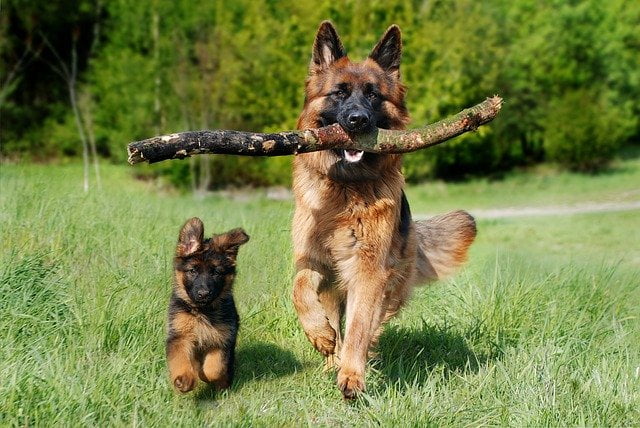Table of Contents
German Shepherds are known for their intelligence, loyalty, and versatility, making them one of the most popular dog breeds in the world. Proper training is essential to harness their potential and ensure they are well-behaved companions. This detailed guide provides training tips for German Shepherds to help you achieve the best results with your dog.

1. Start Training Early: Training Tips for German Shepherds
Begin training your German Shepherd puppy as early as possible. Puppies are more receptive to learning new behaviors and commands, making it easier to instill good habits from a young age.
- Tip: Basic commands such as “sit,” “stay,” and “come” should be introduced in the first few months. Early socialization is also crucial to prevent behavioral issues later on.
2. Use Positive Reinforcement: Training Tips for German Shepherds
German Shepherds respond best to positive reinforcement techniques. Reward your dog with treats, praise, and affection when they perform desired behaviors.
- Tip: Consistently reward good behavior to reinforce positive actions. Avoid using punishment, as it can lead to fear and aggression.
- Resource: For more on positive reinforcement, visit the ASPCA’s dog training tips.
3. Be Consistent: Training Tips for German Shepherds
Consistency is key when training German Shepherds. Use the same commands, rewards, and routines to help your dog understand what is expected of them.
- Tip: Ensure all family members use the same training methods and commands to avoid confusing your dog.
4. Socialize Your German Shepherd: Training Tips for German Shepherds
Expose your German Shepherd to various environments, people, and other animals to build their confidence and reduce anxiety. Socialization is vital for preventing aggressive or fearful behaviors.
- Tip: Regularly take your dog to parks, pet-friendly stores, and social gatherings to expose them to different situations.
- Resource: For socialization tips, check out the AKC’s socialization guide.
5. Provide Mental Stimulation: Training Tips for German Shepherds
German Shepherds are intelligent dogs that require mental stimulation to stay engaged and happy. Incorporate puzzle toys, training games, and new challenges into their routine.
- Tip: Teach your dog new tricks and commands regularly to keep their mind active.
- Resource: For mental stimulation ideas, visit the PDSA’s mental stimulation guide.
6. Exercise Regularly: Training Tips for German Shepherds
German Shepherds have high energy levels and require regular exercise to stay healthy and well-behaved. Daily walks, runs, and playtime are essential for their physical and mental well-being.
- Tip: Aim for at least one hour of exercise per day. Activities like fetch, agility training, and swimming are great options.
- Resource: For exercise tips, visit the Humane Society’s exercise guide.
7. Use Clear Commands: Training Tips for German Shepherds
When training your German Shepherd, use clear and concise commands. This helps your dog understand what you are asking and reduces confusion.
- Tip: Use simple one-word commands like “sit,” “stay,” “down,” and “come.” Be consistent with your tone and gestures.
8. Train with Patience: Training Tips for German Shepherds
Training a German Shepherd requires patience and persistence. Be prepared for setbacks and remain calm and supportive during the training process.
- Tip: Break training sessions into short, focused periods to prevent your dog from becoming overwhelmed.
9. Address Behavioral Issues Early: Training Tips for German Shepherds
Address any behavioral issues as soon as they arise to prevent them from becoming ingrained habits. Common issues include excessive barking, chewing, and jumping.
- Tip: Consult a professional trainer or behaviorist if you need help addressing specific problems.
- Resource: For behavioral tips, check out the AKC’s guide on handling behavior issues.
10. Make Training Fun: Training Tips for German Shepherds
Keep training sessions fun and engaging for your German Shepherd. Use toys, games, and plenty of positive reinforcement to make learning enjoyable.
- Tip: Incorporate play into your training sessions to keep your dog motivated and excited to learn.
Conclusion: Training Tips for German Shepherds
Training your German Shepherd is a rewarding experience that strengthens your bond and ensures your dog is well-behaved and happy. By following these training tips for German Shepherds, you can effectively teach your dog important commands and behaviors. Remember to be patient, consistent, and positive throughout the training process, and enjoy the journey with your intelligent and loyal companion.
Frequently Asked Questions about Training German Shepherds
How early can I start training my German Shepherd puppy?
Training can start as early as 8 weeks old. Begin with basic commands and socialization to lay a strong foundation.
What are the best training methods for German Shepherds?
Positive reinforcement techniques, such as treats, praise, and play, work best for German Shepherds. Consistency and patience are key.
How much exercise does a German Shepherd need?
German Shepherds need at least one hour of exercise per day. This can include walks, runs, playtime, and mental stimulation activities.
How can I socialize my German Shepherd?
Expose your German Shepherd to different environments, people, and animals. Regular visits to parks, pet-friendly stores, and social gatherings can help.
What should I do if my German Shepherd shows signs of aggression?
If your German Shepherd shows signs of aggression, consult a professional trainer or behaviorist for guidance. Early intervention is crucial to address the issue.
Can German Shepherds be trained for specific tasks or jobs?
Yes, German Shepherds are highly versatile and can be trained for various tasks and jobs, including search and rescue, service work, and protection training. Professional training is recommended for specialized tasks.











